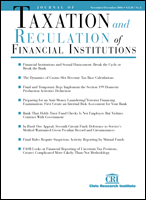When Does a Lien Attach to an Anticipated Tax Refund? Uncertainty Lingers in Light of TOUSA
Author: Thomas J. Hall.; Eric J. Przybylko.
Source: Volume 25, Number 01, September/October 2011 , pp.19-28(10)

< previous article |next article > |return to table of contents
Abstract:
A Southern District of Florida Bankruptcy Court concluded that a debtor’s anticipated tax refund, based on net operating losses incurred by mid-year, is not transferable property of the debtor until the end of the tax year and, as a result, became avoidable as a preferential transfer under Section 547 of the Bankruptcy Code. In finding that the transfer of a lien on a tax refund does not occur until the end of the tax year, the court relied primarily on the language of the Internal Revenue Code, which it concluded deems partial-year net operating losses of “no legal significance.” The same decision, however, affirmed the viability of Supreme Court precedent holding that an anticipated refund is transferable property when the predicates for the refund exist, rendering the decision vulnerable to reversal on appeal.Keywords: bankruptcy; Bankruptcy Code § 547; fraudulent conveyance; preference; acquired rights; tax refund; TOUSA; and Segal v Rochelle
Affiliations:
1: Chadbourne & Parke LLP; 2: Chadbourne & Parke LLP.